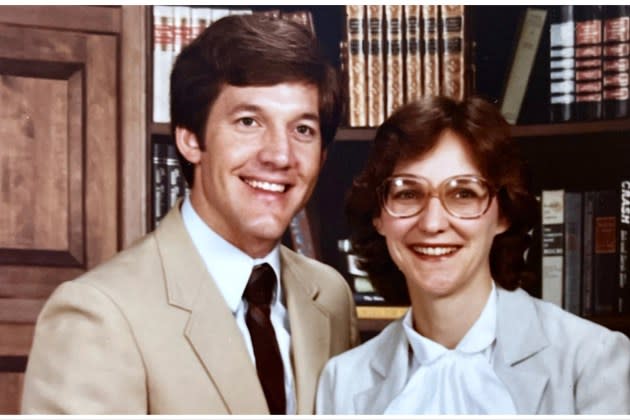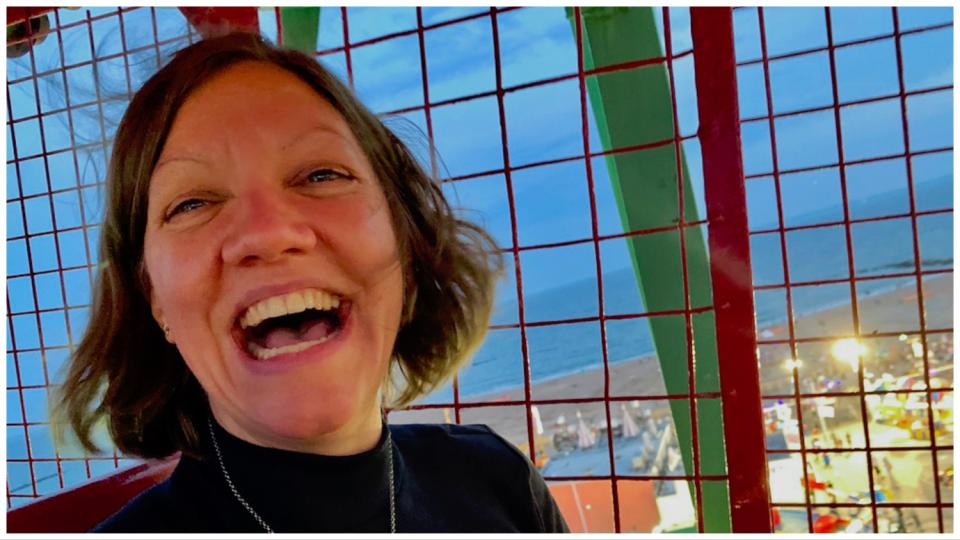‘Flood’ Director Katy Scoggin on Exploring Her Own Escape From Christian Fundamentalism in Visions du Réel Doc (EXCLUSIVE)
- Oops!Something went wrong.Please try again later.
- Oops!Something went wrong.Please try again later.

New York-based director/producer Katy Scoggin has worked with high-profile U.S. documentary filmmaker/journalist Laura Poitras on two shorts and three features, notably as co-producer and DP on Poitras’ Oscar-winner “Citizenfour” and Cannes Directors’ Fortnight’s “Risk.”
Poitras now serves as executive producer on Scoggin’s feature debut “Flood,” one of six creative documentaries to be pitched as works in progress April 16, at the Visions du Réel festival in Nyon, Switzerland.
More from Variety
Filmotor Nabs World Sales for Berlinale Title 'Shahid' Ahead of Visions du Réel Premiere (EXCLUSIVE)
“Flood” centers on Scoggin’s journey to repair her relationship with her former missionary father, with whom she has become estranged. As the story unfolds, she relies on evolution to try to grasp change over time: in the fossil record, in American evangelicalism and in her own shift away from her parents’ religion and back home to reconnect.
The documentary was produced by Scoggin and Will Lennon for Archelon Films, and executive produced by Poitras, Nico Opper and Adam Blackman. It received support from ITVS, the Alfred P. Sloan Foundation, the Sundance Institute, Film Independent, DCTV, Doc NYC, the NYU Production Lab, Gotham Documentary Lab, MacDowell, Logan Nonfiction, Women Make Movies and BAVC Media. Delivery is scheduled for later this year.
We spoke to Scoggin ahead of Visions du Réel.

First of all, you’ve collaborated with doc luminary Laura Poitras on many of her award-winning films. What would you say you have learnt from working with her?
Katy Scoggin: Most of what I know about verité-filmmaking comes from working with Laura. I started as an intern, then evolved as an associate producer, a co-producer and camera person. Not every filmmaker would take someone else under their wing. She is still doing this, and this work wouldn’t exist without her.
Laura taught me four big things:
– The gut knows. The artist listens in and trusts the gut. It always knows.
– Vérité requires immense patience. You’re not going to capture the truth simply by airdropping in, and expecting certain performances and behaviors.
– Speaking truth to power is always worth it, and somebody has to do it. Laura took on some of the biggest powers and systems known to humankind: the war in Iraq, America’s “War on Terror” after 9/11, global surveillance. She is one of the most courageous people I’ve met in my life
– There is room at the table for everyone, for every maker.
After working with Laura on three features (“The Oath,” “Citizenfour,” “Risk”) and two shorts (“The Program,” “Death of a Prisoner”), I went home, looked inside my own gut, and found what power I wanted to speak to. Mine was evangelicalism. And the first way to do that, the first step was to make a vérité piece about my dad.
Could you expand on your initial idea for “Flood”?
Scoggin: What triggered the work was a deeply felt need to untie the knots of my most complicated relationships: first and foremost, my relationship to my father. Alongside and connected to that, my relationship to – and my break away from – evangelical Christianity.
Though it was exhibited to me as a subculture, at heart, evangelicalism is a form of Christian fundamentalism. Thus, it can feel all-consuming to a person who was raised inside that paradigm.
Through my creative art and filmmaking practice, I’ve been crafting “Flood” for about 16 years. Its first iteration was as a short scripted film, which I wrote and directed in 2012 as a film school student. I spent a few years adapting it into a feature film. My research took me into the fossil beds of western Kansas, which quickly became a spiritual journey for me.
Then while I was working with radio journalist Karen Duffin on a creative idea we came up with together, she interviewed me about my filmmaking practice, and in becoming her interview subject, I thought I might better be able to understand the version of me I was trying to write.
How did you approach your family, considering you had been estranged from them for a while?
Today, there is deep religious and ideological division in my family. My father is the only one of us who has remained fully in the evangelical Christian fold. I broke away in my early 20s and left entirely aged 25. My mother and sister have evolved away from “the faith,” as we call it.
The first time I approached my dad was through a recorded phone call. He begrudgingly agreed to be filmed. I sat in the back of a car cowering behind my camera and filming the back of his head and his eyes in the rear-view mirror. I felt scared, but eventually, I entered the frame of the camera (what we call entering your own POV in film – Dorothy does it in “The Wizard of Oz”) and thus embarked on our filmmaking journey together.
I was able to use my vérité filmmaking practice to observe him, and documented [among other things] his 25th and final year of teaching math and science at an elementary school. Through my camera lens, I saw him as a loving, wise, very scientifically-minded, sometimes firm and jovial teacher. Here, I regained respect and lost some of the fear I’d held onto since childhood.
What were the biggest challenges during the filmmaking process?
The biggest challenge was approaching Dad. Receiving a signed release form from him, in which he basically said, ’yes, I will allow you to tell my story the way you want to tell it,’ was very emotional, and it meant the world to me. However, it will be tough to show him the [finished] film.
Then letting go of my own anger and rage – at evangelicalism, fundamentalism, misogyny, patriarchy etc. – was a significant challenge. Everyone’s process of releasing anger is a little different, but in sharing my own, perhaps I can inspire other people who have suffered from religious harm.
Building a team was another huge challenge, although almost all of my collaborators are fellow filmmakers with whom I had worked professionally. Laura [Poitras] was a guide and mentor from day one. I approached editor David Cohen after watching all of his previous films and hearing great feedback from trusted colleagues like EP Nico Opper and editor Erin Casper, people who knew his depth and talent and his ability to “cut funny.”
On the production side, how did you hook up with your producer Will Lennon, and how did you raise financing?
Financing-wise, I was working alone for a while. This is how it is in the U.S. – you work until you run out of money, then raise more money. What allowed me to build a team was ITVS, the U.S. public TV funding. They came in with $350,000, which made a big difference.
After “Citizenfour,” having spent a year and a half in Berlin, I came back and was hired as a camera woman on a TV project [“Primaries”], produced by Will. We worked together for a year on the 2016 presidential campaign trail – attending all the conventions – Democrat, Republican and more. We basically saw America together. This is when we got close. He grew up in Missouri, the evangelical heartland of America but never was evangelical himself, so he understands where I come from. He and his partner Sarah Ginsburg [one of the DPs on “Flood” with Spencer Worthley, Michael Rossetti, Nathan Trusdell] also run a philanthropic organization.
Now that the film is closer to complete, on a personal level, I am beginning the grapple with my queerness. The feeling is – I can’t hide anymore, so I might as well be who I really am.
When will you deliver the film?
We hope to do picture lock later this spring and hopefully we’ll premiere it at a festival this fall. I’d like the release to coincide with the U.S. presidential elections. At a time when communities are polarized, and far right movements are on the rise in many parts of the world, it’s urgent to create understanding, to promote communication and love. Hopefully the film will contribute to this.
What do you hope to achieve at Visions du Réel?
First of all, I’m looking forward to reconnecting to the amazing people behind this festival who have been tracking my film since 2018.
“Flood’s” international rights are still available, so we hope to reach out to international broadcasters, distributors and sales agents. Also, we still need to raise some financing – about $100,000 – to finish the film. Finally, as a New Yorker, I love Switzerland. There are certain things – like quiet trains and what to do with garbage – that the Swiss have just figured out and New Yorkers could learn a lot from this country!
(The interview has been edited and condensed for clarity.)
Best of Variety
Sign up for Variety’s Newsletter. For the latest news, follow us on Facebook, Twitter, and Instagram.

